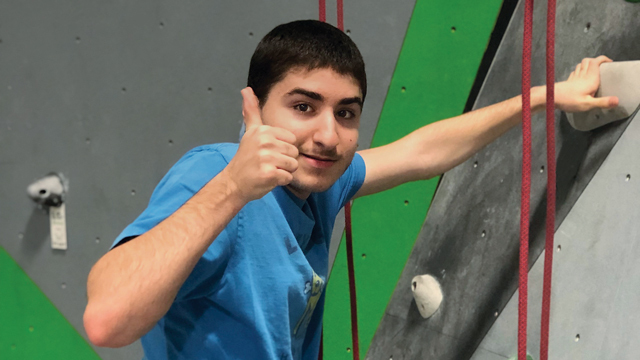Welcome to March! The month when daffodils and tulips begin popping out of the ground and frigid mornings become the exception rather than the rule.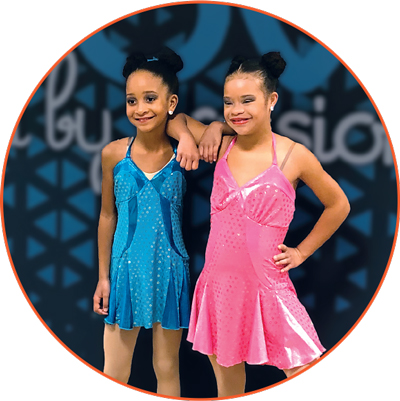
Along with the month’s promise of warmer weather comes slight panic for many parents: In a few short months, kids will be out of school for the summer and may require some structured activities to peel them away from electronics. While March signals the glorious beginning of spring, it also means time to register for camps.
For kids with special needs, camps can play an important role of providing structure and enrichment. It can be challenging, however, for parents to find the right fit for a child’s particular needs.
Camp Time for Kids with Special Needs
Richmond, along with surrounding areas, hosts many camps for kids with special needs. Some, like Camp Easterseals and Camp Virginia Jaycee, welcome participants with a variety of needs and disabilities, while others, like the Muscular Dystrophy Association’s Summer Camp or CampFree2BeMe from the Richmond Autism Integration Networks, are developed for children with specific needs and challenges.
Beth Bumgarner of Chesterfield first sent her 9-year-old son Ben to the Greater Virginia MDA Summer Camp at the 4H Airfield Conference Center in Wakefield, Virginia, in 2017. Ben has Duchenne muscular dystrophy, and the camp is specially designed for children with neuromuscular disorders. When Ben first attended, the camp accepted kids as young as age six; they have since bumped up the attendance age to eight.
“It was difficult the first year sending my 6-year-old off to overnight camp for a week,” says Bumgarner. “You don’t have any communication with them all week, which was really hard.” At that point, Bumgarner’s two older sons had not even attended overnight camp, so the experience was completely new. “It helped that Ben didn’t hesitate to go,” Bumgarner says. “He’s the youngest of three, so he has always been like, ‘I’ve got this, Mom. You don’t need to baby me.’”
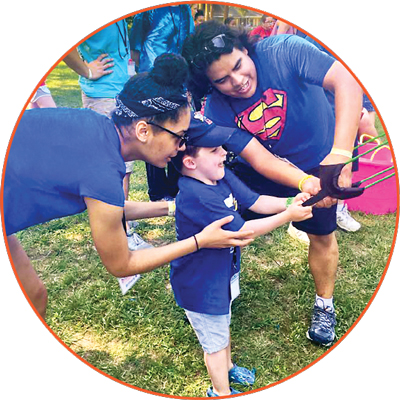
Bumgarner says kids at MDA Summer Camp get to participate in classic summer activities like canoeing on the lake, horseback riding, and crafts. “Everything’s accessible, and if there’s something the kids want to do, the camp staff find a way to let them do it,” she says. “There are no limitations.” Many participants are in wheelchairs full-time, but the one-on-one counselors with physical therapy and occupational therapy backgrounds and the firefighters who volunteer each day ensure the kids can participate in all of the activities. As with traditional camps, the kids sleep in cabins with their peers and counselors.
Not only do the kids participate in typical camp activities they might not be able to do elsewhere, they get to
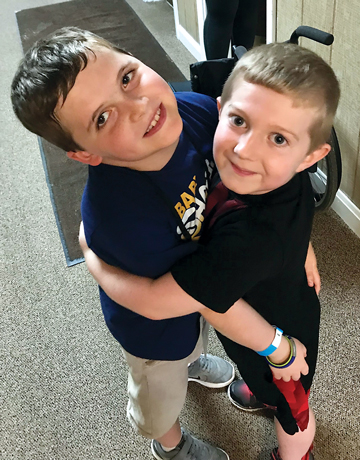
experience spending a whole week with other kids like them. “Ben’s the only kid in a school of 1,300 kids who uses a wheelchair regularly,” says Bumgarner, “so I think camp just makes him feel normal.” Ben is still able to walk much of the time, but he uses a power wheelchair to travel quickly or to cover long distances.
Because muscular dystrophy causes progressive weakness and loss of muscle, there are a wide range of needs at MDA Summer Camp. Many younger kids are still able to walk, and older kids use wheelchairs full-time and need help being transferred to their beds.
Being around other kids who have muscular dystrophy helps Ben feel more confident, his mom says. He can be slow to warm up while at home, but in the camp environment, he seems more comfortable being himself. His first summer at MDA Summer Camp, he even took the stage during a talent show, teaching the staff and fellow campers – as well as the volunteer firefighters – the words and choreography to the “Baby Shark” song. “That’s not something I would have anticipated him doing,” she says.
Bumgarner says Ben looks forward to going to MDA Summer Camp all year round. When participating in MDA activities throughout the year, Ben often sees friends from camp and is eager to connect with them over the summer. While participating in power soccer (an adaptive sport offered through Sportable in Richmond) during the school year, Ben gets a chance to see older friends who look out for him when he’s at camp.
Because Ben has to miss the last week of school to attend MDA Summer Camp, he often talks to his friends about where he plans to go and what he will be doing. “It has definitely become a conversation point for him the rest of the year to tell other people about camp,” she says.
The experience is so positive for Ben that Bumgarner encourages the families of newly diagnosed kids she meets to send their child to camp the first year they are eligible. “As hard as it may be to leave him there, it’s been a wonderful experience.”
When Traditional Camps are a Fit
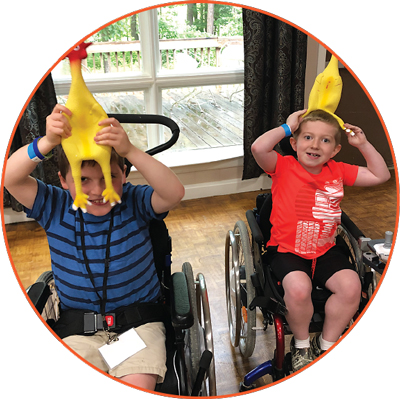
Carissa Garabedian of Short Pump, founder of KnowDifferent.net, a resource for families with kids who have special needs in Richmond, has sent her 17-year-old son Marky to camps designed specifically for kids with autism. Because he is considered high-functioning, however, he sometimes is not stimulated enough.
Garabedian says Marky thrives at camps focused on his interests, like LEGOs or coding, not necessarily ones that are designed for kids with special needs. “It took me a while to figure out there are many camps that do not advertise themselves as being special needs camps that can absolutely 100% work with my child,” she says. “He’s not going to have the same experience as most of the typical kids, but as long as they can assure me he will visually be able to see what’s going on and they’re aware of where he is, we can do it.”
The vacation Bible school at a neighborhood church, for instance, has worked well for Marky because he
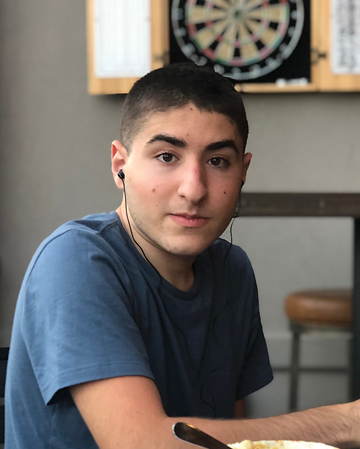
enjoys the music and crafts. “There are so many student volunteers who know him and love him, and there are enough hands to keep him busy and enough eyes to keep him safe,” Garabedian says. Although the VBS staff doesn’t advertise the program as a camp for kids with special needs, Garabedian found through communication that they could provide a positive environment for Marky.
When signing up for camps, Garabedian takes several steps to ensure a positive experience. She knows Marky’s strengths and limitations and will not try to schedule a camp that lasts for eight hours a day because it would be too much for him. She tends to schedule camps intermittently through the summer to allow for downtime for Marky.
Noting that kids on the autism spectrum tend to wander or bolt from safe settings, Garabedian would also be leery of registering Marky for a camp with large open spaces or with field trips unless she felt extremely confident with the number of staff available to ensure that her son would be safe at all times.
According to Garabedian, it’s important for parents to know their child’s abilities and communicate that with the camp’s director to determine whether the camp would be a good fit. “Trust your gut. If you feel like the camp is willing to give your child that experience, then go for it,” Garabedian says. She advises parents and caregivers who don’t think they’re getting enough concrete information in a preliminary meeting with a camp representative to pass on a camp experience.
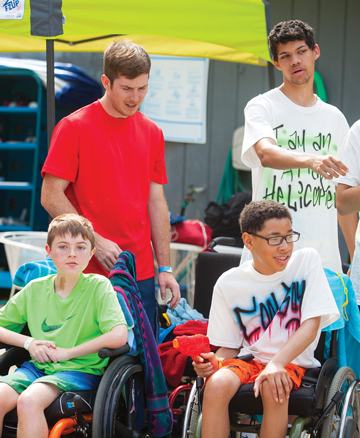
Parents also need to be cautious of activities that would be difficult for their child, Garabedian says. A camp that involves swimming would not be the best choice for a child who fears the water or who doesn’t yet know how to swim, but might be drawn to water.
When Garabedian talks to a camp director about signing up for a particular activity, they may decide together that she will wait to pay the tuition until determining whether the camp will be a good fit. Sometimes she will observe on the first day to ensure Marky is having a positive experience, and she often communicates with staff throughout the week via email or handwritten notes. She also ensures she is always available by cell phone.
The hard work of finding a good camp fit often pays off. Participating in camps for typically developing children has been beneficial for Marky as well as for other campers. “He’s done coding camps, and he actually taught the staff and other kids a few things,” says Garabedian.
A Full Summer Schedule with Camps and Activities
Taylor Carpenter of Midlothian is a busy 11-year-old year-round, and that activity level picks up in the summer. She plays piano, participates in dance and ice-skating competitions, and last summer, she spent time in New York City taking part in a film project. Throughout the summer, Taylor’s parents keep her busy through a variety of activities; some of these are geared toward kids with special needs while others are not.
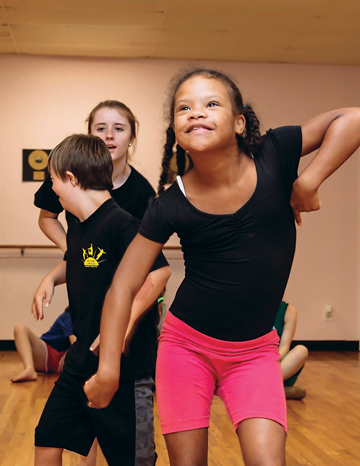
Taylor, who has Down syndrome, participates in a variety of outings with the Down Syndrome Association of Greater Richmond. Although she has not participated in overnight camps for kids with Down syndrome, she has enjoyed camps for kids with special needs, including a tennis camp sponsored by VCU and the iCan Bike camp, a week-long experience that teaches special needs kids to ride bikes. “Learning to ride a bike is so important,” says Taylor’s father, Michael Carpenter. “It provides exercise and opportunities to socialize as well as access to the world.”
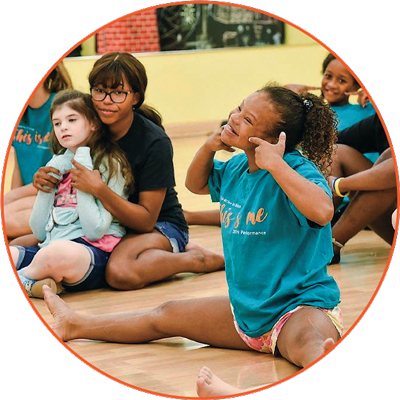
Like Marky, Taylor also enjoys participating in her neighborhood vacation Bible school. “The kids already know Taylor, so we feel comfortable leaving her there,” Carpenter says. In addition to VBS, Taylor participates on her neighborhood swim team with her 9-year-old sister Mimi, where she has another opportunity to interact with the kids who live nearby. “Taylor likes swim team for the opportunity to socialize,” says Carpenter. “She is the unofficial cheerleader who loves cheering everybody on.”
During the summer, Taylor continues the activities she pursues during the school year, including dance through Miracles in Motion, which she has participated in since age two. She performs in competitions twice a year and traveled to Austria for the Special Olympics World Winter Games in 2017. She also continues her ice-skating training, which she started three years ago. Taylor is the only Special Olympic figure skater in the area; she performs before the Special Olympics speedskating competition and competes against typically developing kids.
When Taylor can find time in her busy summer schedule for a camp or other activity, her parents like to ensure it will be a positive experience for Taylor and the other children. Soccer, says Carpenter, is not an activity they will likely repeat. That’s because Taylor – who tends to be more of a leader than a follower according to her dad – preferred to spend her time picking flowers rather than kicking the ball and encouraged her teammates to do the same.
While soccer may not have been a good fit for Taylor, swimming, dancing, and ice skating showcase her talents and provide memorable experiences. Whether participating in a camp, lesson, or class with other kids who do or don’t have special needs, Taylor thrives when given the opportunity to connect with peers, develop skills, and take on new challenges. That’s the ultimate goal of summer camp.
Maximize the Camp Experience for All Kids
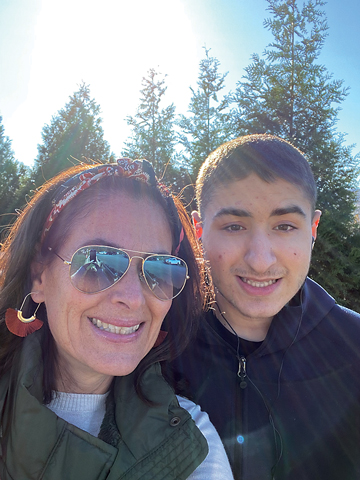 When Carissa Garabedian sends her son Marky to camp, she does her preparation to ensure the camp will be a good fit. She consults with the camp director and prepares Marky for the experience by talking through the schedule for the day with him. She reminds him that at any moment, he can tell the camp staff or volunteers if he’s unhappy.
When Carissa Garabedian sends her son Marky to camp, she does her preparation to ensure the camp will be a good fit. She consults with the camp director and prepares Marky for the experience by talking through the schedule for the day with him. She reminds him that at any moment, he can tell the camp staff or volunteers if he’s unhappy.
Garabedian, Richmond mom and founder of KnowDifferent.net, which provides resources for special needs families in Richmond, has suggestions
for the ways typically developing kids can help foster a positive experience for kids with special needs who they might encounter during a camp experience. “It’s important for kids to be aware that special needs kids see and hear everything,” says Garabedian. “So, don’t laugh at, – only with. Don’t roll your eyes, and watch your words.”
She encourages campers to ask questions and try to engage with special needs kids, but reminds them that not all special needs kids will respond. “It depends on the child,” says Garabedian. “My son might give only a word or two if kids ask questions, but I know other kids who will say, ‘I have Down syndrome, and I’m a superstar’ or ‘I have autism, and I love hugs.’” Regardless of the response, it’s important for kids to try to engage in conversation.
That’s also an important lesson for kids who are volunteering. “So much of what our special needs kids want is to feel accepted. If they get that smile or that extra hug or you hold their hand, our special needs children are going to feel so happy,” says Garabedian. “They’re going to feel like they’re part of something bigger, and that’s going to be such an important message to give to them.”
Garabedian also encourages youth volunteers to ask questions and seek help when they aren’t sure what to do. Ultimately, Garabedian believes children benefit from being around kids of all abilities and sharing diverse experiences during recreation. “The kids volunteering are going to learn more than the kids with special needs,” says Garabedian. “Their exposure to our kids is going to open their eyes to so much more and hopefully give them a level of gratitude, appreciation, and perspective.”
Photos: Niki Benfield, Justin Ide, Miracles in Motion


